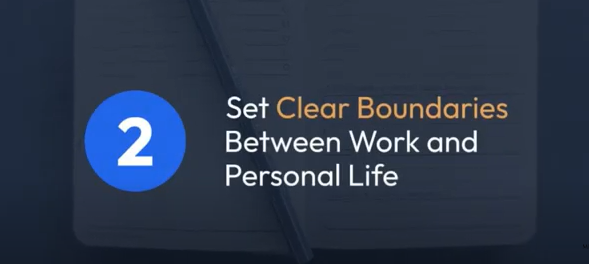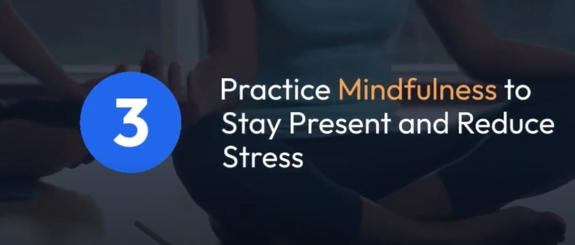When Do We Need to Balance Our Work Life?
Work-life balance involves finding a healthy distribution of time and energy between our job and personal life. Below are a few factors indicating that it is important to balance our work life.
- Having persistent feelings of stress and anxiety
- Constantly thinking about work-related matters
- Increased irritability and pessimistic thoughts
- Feeling exhausted
- Lack of motivation or enthusiasm for work
- Neglecting personal self-care and hobbies
- Difficulty in maintaining relationships with family and friends
- Difficulty sleeping due to work-related concerns
- Reduced focus and concentration at work
- Decreased job satisfaction and a sense of dissatisfaction with life overall
How We Can Balance Our Work-Life?
Let’s dive into some strategies that can transform your daily routine and bring harmony to your professional and personal spheres. Get ready to take charge of your life!
1. Prioritize Tasks and Set Realistic Goals

Start each day by identifying the top three most important priorities. This helps you focus your energy on tasks that have the greatest impact.
For example, if you are a working professional, you can start the day by identifying the top three most important tasks such as preparing for an important client presentation, completing a crucial report, and following up on urgent emails.
2. Set Clear Boundaries Between Work and Personal Life

Avoid responding to work-related emails or calls outside of your designated work hours. Create a separation between professional responsibilities and personal time.
Suppose, it’s a Sunday afternoon, and you’re spending quality time with your family at a park. Suddenly, you receive a work-related email notification on your phone. Instead of immediately checking and responding to the email, try resisting the temptation and reminding yourself of your commitment to work-life balance. Understand that your personal time is valuable and it deserves attention.
3. Practice Mindfulness to Stay Present and Reduce Stress

Dedicate a few minutes each day to deep breathing exercises or meditation. These practices calm the mind, reduce stress, and promote inner peace.
Suppose you’re feeling anxious about speaking up in a meeting. In such moments, take a deep breath, close your eyes, and count down from five to one. As you exhale, release any tension or nervousness. Repeat this technique for five minutes, focusing on your breath and allowing yourself to regain confidence.
4. Take Breaks Between Work to Recharge and Rejuvenate

Take short walks or engage in physical activity during work breaks. It boosts circulation, releases endorphins, and combats the sedentary nature of office work.
During your 15-minute work break, allocate 5 minutes to walk around the office premises or nearby area. Feel the sensation of your feet touching the ground, breathe in the fresh air, and observe the sights and sounds around you.
5. Let Go of Perfectionism

Instead of fixating on minor flaws or mistakes, focus on overall progress and growth. Embrace imperfections as opportunities for improvement.
For instance, if you make a typo in an email, acknowledge it as a minor error and an opportunity to improve your attention to detail.
6. Reconnect Yourself with Your Family After Work

Spend quality time with your family by engaging in shared activities, conversations, or celebrations. Strengthen relationships and nurture emotional connections.
Imagine returning home from a long day at the office, you can consciously set aside this time to spend with your family. Whether it’s assisting your children with their homework, lending a helping hand to your partner in the kitchen, or simply enjoying a movie night together.
7. Take a Vacation

Intentionally schedule vacations to provide a well-deserved break and engage in activities that bring you joy and fulfillment.
Let’s say you have been working diligently on a major project for several months, putting in long hours and managing tight deadlines. You decide to plan a vacation to a tropical destination as a way to relax and recharge.
8. Use a To-do-list at the Office and Home

Create a clear overview of tasks, deadlines, and allocate time and resources effectively. It reduces stress and increases productivity.
Let’s say you have a busy workday ahead of you with multiple tasks and deadlines to meet. You can create a checklist, and as you complete each task, you can check them off the list, providing a sense of accomplishment and progress.
9. Ask for Mental Support

Share your concerns with someone who cares about you to receive emotional support and a safe space to vent or process your emotions.
Imagine you’ve been feeling overwhelmed and stressed due to a recent personal loss. You can meet up with your friend for coffee and start opening up about your emotions. You can express how the loss has been impacting your daily life, causing sadness, and difficulty concentrating which can offer you a soothing emotional comfort.
10. Get Professional Help

Consider working with a therapist who can help develop coping strategies tailored to your needs and circumstances. Try to understand the seriousness of your issues, if your problems affect daily life functioning search for a professional who is nearby to you or you can seek help from your close ones about it.
For example, in therapy sessions, you may discuss your work-related challenges, stressors, and personal goals. The therapist can help you explore strategies to establish boundaries, manage time effectively, prioritize self-care, and enhance your overall well-being through discussions, exercises, and reflection.
Imagine a life where you have the time and energy to enjoy both your work and personal life to the fullest. That’s the power of achieving a work-life balance! It’s about finding harmony between your career and personal well-being. By striking this balance, you prioritize what truly matters – spending quality time with loved ones, pursuing your passions, taking care of your physical and mental health, and creating lasting memories.













